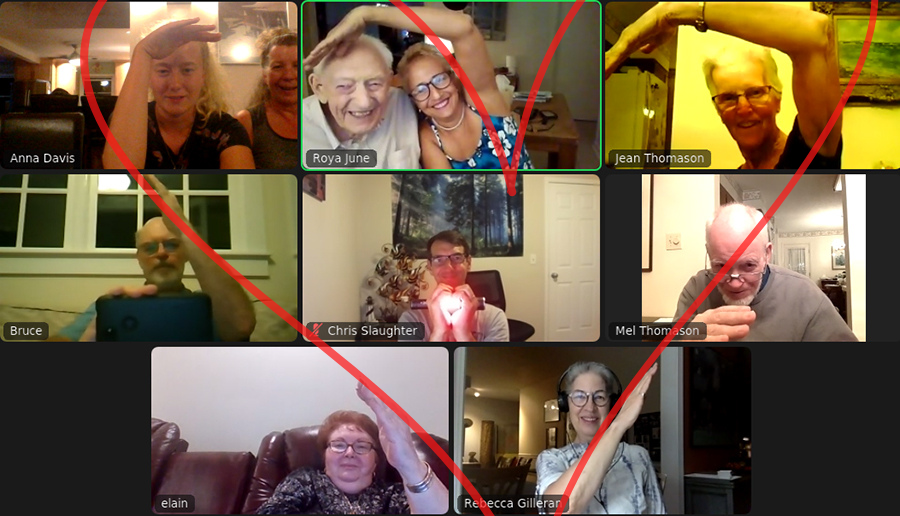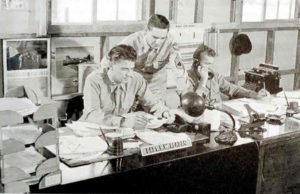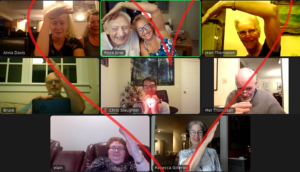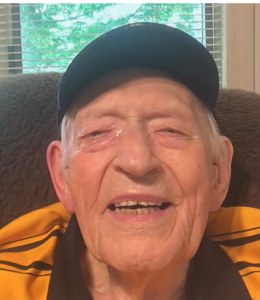



Two days was all it took for Verl Luzena to listen to a compilation of 25 audiobooks titled Windows to the Past by Darius Shahrokh.
Luzena, a 99-year-old World War II veteran, is hard of hearing and can no longer see. He is the first person to declare as a member of the Baha’i Faith in Transylvania County, North Carolina.
The visual storyteller
Luzena, now a retired chemist, served in the U.S. Army Air Force as a young man from 1942-1945. He has a love for photography that emerged at age 12 when a family friend taught him how to use a camera.
The Army assigned Luzena to the 4th Camera Combat Unit (CCU) of the Ninth Air Force, “one of only 14 CCUs worldwide during World War II,” points out Roya Shahrokh — Darius Shahrokh’s daughter and Luzena’s friend — in a chapter written about Luzena from the 2019 edition of World War II Veterans of Western North Carolina: Their Stories in Their Own Words.
Luzena received photographic and motion picture training in Culver City, California. This training was one of many contributions the Hollywood establishment made toward the war effort; “Ronald Reagan was the paymaster/personnel officer for his unit,” the book states.

After being briefly stationed in England, Luzena landed on the shores of Normandy on the night of D-Day, June 6, 1944. After a three-day ordeal in the midst of gruesome battle, he managed to find a pilot on the beach, who flew him back to England so he could securely deliver the film footage he had taken.
He continued to visually chronicle the war in other areas of France, Belgium and Germany. “A lot of the clips that you see of World War II, especially when they raided Hitler’s office — Verl took those photos and films,” says Roya Shahrokh.
One time at a movie theater in England, Luzena was surprised to see a newsreel by Pathé News, one of the largest film production companies of the early 20th century, that used his footage along with captions he had written. In 2000, notes Shahrokh, his work was described in the documentary film Shooting War: World War II Combat Cameramen.
The book quotes Luzena as saying that though he carried two weapons at all times, he was able to get through the war without using either one.
The audio storyteller
Meanwhile, in postwar Tehran, Iran, Daryoush “Darius” K. Shahrokh was working toward his medical degree. In 1955 he made his way to Michigan, Minnesota and Wisconsin, to complete a residency in otolaryngology. In the 1960s he was only the “second or third Iranian to be a Mayo Clinic fellow,” wrote his wife, Grace, on a website dedicated to his memory. He became a U.S. citizen after a mentor at the Mayo Clinic, who was a friend of then-Sen. Hubert H. Humphrey, advocated on his behalf and a special bill was passed in Congress.
For 20 years Shahrokh ran a private practice in Fond Du Lac, Wisconsin, then in 1987 he relocated to Sacramento, California, where for 10 years he headed the Ear, Nose and Throat Department of the Veterans Administration/Veterans Affairs clinic. “He felt a great honor to serve the veterans of the VA clinic … he appreciated the sacrifices of veterans,” wrote Grace.
Shahrokh “loved the history of the (Baha’i) Faith,” Grace stated in a 2005 obituary published in The American Baha’i. His service to Baha’i communities contributed to formation of the first Spiritual Assemblies in Rochester, Minnesota, and Fond du Lac. He also contributed to the launch of Wisconsin’s Baha’i summer school.
Over the years, hosting storytelling gatherings to deepen people’s understanding of Baha’i history was central to Shahrokh’s service. Once retired, in the early 1990s Shahrokh intensified his study and began a “five-year project to record the Windows to the Past tapes,” wrote Grace.
With Grace by his side to collaborate with research, transcription and editing, as well as friends who contributed recording equipment, Shahrokh completed this service while ensuring accuracy and production quality. He passed away in March 2005.
Now remastered into downloadable audiobooks/files with Roya’s help, her father’s 25 audio programs are aimed at informing and inspiring, she says. They help “meet the needs of people … with vision or reading problems, audio learners…those with long commutes,” wrote Grace. The recordings also serve as an option for people who may be unable to access reading materials in person.
Connecting across time
In 2016, after a flood devastated his Louisiana home, Luzena, then 94, moved in with his son John in “the land of the waterfalls” — Transylvania County, North Carolina. John was a family friend of the Shahrokhs, who also had settled in western North Carolina, and he introduced Luzena to Roya and Grace.
Luzena recalls how Grace Shahrokh introduced him to her husband’s audiobooks along with a few Youtube versions. Grace passed away in January 2017.
In March 2020 when the COVID-19 shelter-in-place orders began, Luzena invited Roya to stay at his home. Roya served as Luzena’s caretaker during the height of the pandemic.
The two spent their days in conversation, reflecting and reminiscing on Luzena’s life. They explored various themes related to the Baha’i Faith and shared stories about its history, its principles, and its role in the life of society. “His favorite topics are life after death, detachment and the Baha’i vision of the future,” Roya states.
Then in summer 2020, Roya reintroduced her father’s audiobooks to Luzena and he connected more deeply with the Baha’i Faith. “It was so interesting,” Luzena states. “I just kept digging right into them.”
“He [Shahrokh] was so thorough with everything and conscientious about it,” Luzena says. “I just hated the fact that I had missed him in life. He was such a wonderful man.”
Luzena says he was brought up in the Methodist Church, “and both of my grandmothers were leading women of the church.” While he listened to Shahrokh speak on the oneness of religion, Luzena says, his heart was moved by the explanations of how religions relate to one another. “I had a good feeling,” he says. “You know, I happen to have listened to a few ministers in my life but he by far outclassed them all.”
With renewed spirit


After listening intensively to the audiobooks, Luzena shared with Roya that he had come to believe in Baha’u’llah and expressed his desire to declare as a member of the Baha’i Faith. On Sept. 7, 2020, Luzena, 98, sat alongside Roya and proclaimed his belief at a community meeting held over Zoom with the Baha’is of nearby Buncombe County. “This is what I’ve always believed,” says Luzena.
“How sweet it was,” says Elaine Barnett, secretary of the Spiritual Assembly of the Baha’is of Buncombe County. “It was really wonderful and our community was blessed by it.”
Just three months shy of his 100th birthday, Luzena expresses how grateful he feels to have made it this far in life, and acknowledges that although he might not have much more time left, becoming a Baha’i is the start of something new. “It’s getting really close, you know,” he says. “It’s a big deal for World War II veterans to make it to 100,” Roya says. “Yes, not too many make it to 100,” Luzena adds.


Spending time with Luzena gave Roya the opportunity to more deeply appreciate long, enduring friendships, the patience that is practiced when serving those in their elderly years, and how powerful learning can be at any age. “Verl is amazingly open-minded and one shouldn’t assume that just because people are older that they are not open to learning,” says Roya.
Barnett reflects that this friendship demonstrates how important it is to walk a path of service and learning in the company of those who have reached the later stages of life.
Then there’s the influence Luzena’s life will have on the future of the Baha’i community. “Verl has lived his life and towards the end of it he’s discovered the treasure, so to speak, and I just think it’s wonderful,” Barnett says. “I also know what it means to me to have discovered Baha’u’llah and so I can only imagine, at that age, what it has meant to him.”
Editors note: This story was reported a few months ago. Verl Luzena died on December 10, 2021, two weeks shy of his 100th birthday.


![]()
![]()
Whether you are exploring the Bahá'í Faith or looking to become an active member, there are various ways you can connect with our community.
Please ensure that all the Required Fields* are completed before submitting.